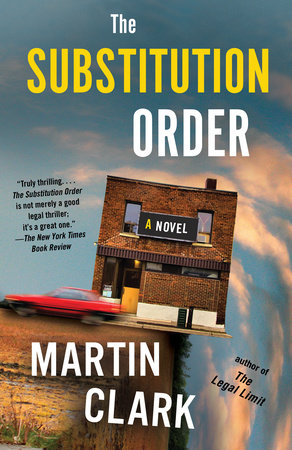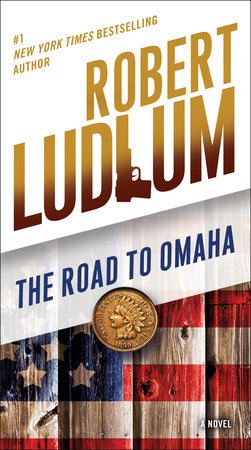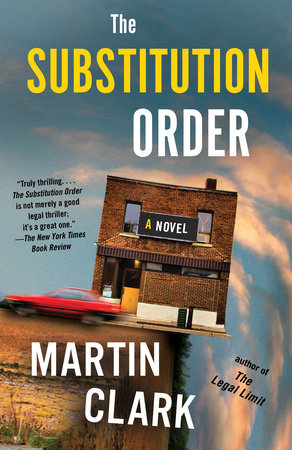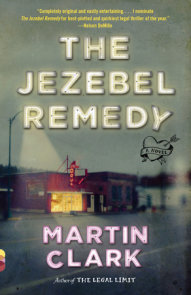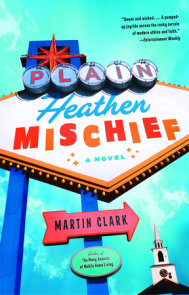Author Q&A
Q: Was there a particular idea or event that was the genesis for The Substitution Order?
A: In the last few years, there have been several media accounts—here in Virginia and elsewhere—of solid, competent attorneys and law firms losing six figures to con artists. Funny—I always figured we lawyers are the folks who’re supposed to hoodoo innocent people. Reading those stories set me to thinking about how vulnerable our system is, most notably because of the handshake deals that still exist between lawyers, the requirement that virtually all our files and court orders be open and public record, the commonwealth’s pitifully lax online security, and a misguided belief that no one would dare fool with our documents given the threat of a felony conviction and jail time.
Q: Would it be correct to say that Kevin Moore has more in common with his creator than perhaps any of your other characters?
A: Years ago, I was on a radio show called Book Talk. The host is a talented guy named Stephen Usery. He discovered that my favorite writer is the late Larry Brown and sent me an interview he’d done with Larry. Larry mentioned that he liked to create interesting characters and “then load them up with troubles” and see what happens. My books are plot-heavy and plot-driven, and, as always, when I started The Substitution Order, I had ninety-five percent of the story, from alpha to omega, worked out in my head. Usually my plots carry the characters. I decided, though, that for this novel, I wanted to try Larry Brown’s trick, so I created Kevin Moore and among the load of troubles I visited on him was a heart attack. About eighty pages into writing the book, I had a stroke. It was bad and it cost me a year of my life, but thanks to two medical miracles and a godsend surgeon and a steadfast wife, I’m recovered and normal and back to where I was. Not to give too much away, but I figured, hey, “write what you know,” and changed Kevin’s medical bad luck. That said, his history is completely different than mine, both medically and temporally, because that’s what the novel needed to be interesting and keep moving. Still, I think I’m damn qualified to detail the hardships that come along with having your head blow up and almost dying.
Q: You’ll be retiring this year after 27 years on the bench. What are you going to do?
A: Fly fish a lot. And here in Virginia, even after retirement, we’re required to serve as a substitute judge, so in the fall I’ll be back at the courthouse a time or two each month and that will continue until I hit seventy. I’m fifty-nine now. The good news is that we can pick and choose the cases we hear, and I can safely say I will try my absolute last murder case in April 2019, as well as my last complex civil jury trial. My fill-in work will be on shorter, straightforward cases. Also, I’ve signed up with the state to do mediation. And, finally, I do have a second gig—I’ll probably try my hand at writing a novel that clumsily incorporates some of my experiences as a judge and lifts most of its memorable lines from lawyers I’ve met along the way.
Q: From the start of your career as a novelist your fiction has been informed by your work as a judge. So I’m curious now that you are about to retire how do you think that will impact your writing?
A: It won’t. Believe me, I’ve got plenty in the bank.
Q: Kevin Moore is disbarred, disgraced, broke, on the brink of divorce, and now the target of an elaborate insurance scam. It’s pouring on him for sure! You seem to love characters who are down on their luck in more ways than one. Accurate assessment? Does bad luck beget bad luck?
A: Bad luck does tend to lead to more bad luck. Often, the combination of a fluke illness, subpar medical treatment options, and a lack of decent health insurance is ruinous for people who’ve worked every day and done the right thing for years and years. Bad health will walk you right into foreclosure and bankruptcy. Or a single bad choice at age eighteen can start a legal avalanche that some defendants will never get past. I think readers enjoy seeing creative, resourceful underdogs win, especially when the underdog whips a rigged system or hammers a complete villain.
Q: I was struck by just how easy it is to run a scam on someone without the resources to fight it. The one at the center of The Substitution Order is actually pretty brilliant. How do you come up with these schemes?
A: Thanks for the compliment. After over three decades in the legal world, I understand where most of the trapdoors are hidden. I do my level best to make the scams in my books accurate, realistic and understandable. The plot zinger in Plain Heathen Mischief came from an actual case that I tried. The Jezebel Remedy highlighted how easy it can be to manipulate powerful DNA evidence. The payoff in this novel deals with the “honor system” that still applies to so much of the paperwork processed in the courthouse—I think most people would be surprised to learn that the majority of pleadings, motions and final orders are not notarized or in any way independently verified. If there was a lot of cash at stake, and a hustler or a certain down-and-out lawyer wasn’t afraid of a felony conviction and a jail sentence, this oddity might be a potential opening to do big, fun things.
Q: Can we talk about the dogs in your novels? In this one it’s the wonderful Nelson. Also, are we going to get a cat one of these days?
A: I’m definitely a dog guy. After the death of Robert Earl Keen Clark (known as Earl), Deana and I have two dogs, a Lab, Eudora, and an Australian shepherd, Zelda. We also have three cats, all rescues in a manner of speaking. I’m not sure how much a cat would add to my books—ignoring humans, sleeping, hiding, hissing and scratching the new furniture aren’t great narrative hooks. But I do have a crackerjack cat tale. In late September 2018, Deana saw a huge hawk dive-bombing our backyard, so close to the ground that Zelda was giving chase. We assumed the hawk was after our chickens. The next morning, Deana heard a cat crying, and she found a feral tabby, maybe five weeks old, hiding behind a propane tank. The kitten’s face was a mess, and his eye had been punctured and was swollen shut. The holes in his face were clearly from talons; he was dropped by the hawk. When Deana picked him up, he bit the fire out of her and then fled, and we couldn’t catch him, and we sure as heck needed to in case he was rabid. I later spotted him near our vehicles, but he disappeared, and when I checked under the hoods, he wasn’t there. Deana took the Escape for a photo shoot, drove several miles toward Kibler Valley, realized she’d forgotten a lens, returned home, and, you guessed it, we heard the cat cry—he was in the engine-frame and somehow hadn’t fallen out. We lured him into the open with food, got a clean shot at him while he was eating, caught him, located him in the barn’s tack room for ten days of rabies observation, hauled him to the vet, had him patched up, and now he’s healthy and the little king, roaming the house, a friend to all, both eyes working just fine. We named him Ace because he finally caught a good card.
Q: How has Patrick County remained such creative rich soil for you all these years?
A: I’m from here, and there’s a lot to write about, though these days it’s not all happy news. Our community is struggling. The hospital that saved my life here in Stuart is closed, same as many other smaller rural hospitals. Our “representatives” in Richmond and Washington drop big deal press releases and show up for photo ops, then remind us of the marketplace, as if the prudent solution is to trust that Adam Smith’s invisible hands, insurance company CEOs making nineteen million a year, and corporate monopolies with armies of lobbyists will take care of our critical medical needs. Don’t get me started. The gifted doc who saved my life at the ER has moved away. My friend Dr. Huff now lives in Ohio. Who can blame them? Manufacturing is gone, the plants are mostly closed, decent jobs are scarce. Our county had to borrow money to make it through the fiscal year. While the county economy is in fact not the board of supervisors’ fault, our local leaders somehow managed to give our economic development grant to a fly-by-night company that simply clipped us for over a million bucks and never so much as turned a shovel of dirt. Just what we needed—a million dollars squandered.
Much of this book happens in Meadows of Dan—“the mountain,” we call it—a remarkable section of the county that’s still strong and seems set apart from the rest of the world. The sense of family and community there is a rare and amazing thing and, in my estimation, the predicate for this area’s continuing vitality. As Kevin Moore observes in The Substitution Order: I’ve discovered that the mountain people, the locals, have generous natures—“free-hearted” is the Patrick County expression. Meadows of Dan is also, in certain spots, one of the most gorgeous places on the planet, especially in the fall. All great stuff for a novel.
Q: The Substitution Order is very much a novel about genuine remorse. Is it fair to say this is a theme that in some ways runs through all your novels?
A: There are several riffs in the book that touch on this. Here’s what I’ve learned after nearly three decades on the bench: Almost everyone is remorseful in court, and the sentiment is usually sincere and genuine. It can be very moving, no matter how many times you’ve seen and heard it. After a month in jail away from dope and booze, people truly feel bad about stealing from a neighbor and leaving their own kids without food on the table. Domestic abusers—almost always men—weep harder than any other defendants. The cheaters and strayers in divorce cases often have a moment on the witness stand where their voices break and they clearly regret leaving a spouse and destroying a long-term marriage. But here’s what I’ve also learned: Shame and remorse and embarrassment alone will not fix the problem. Having to call your mom or grandma as a witness to beg the judge for your third chance on probation won’t keep you from stealing again, or using meth, or losing another job, or, yep, swiping her jewelry or Social Security check. Crying and apologies are worthless the next time an angry, abusive spouse is drunk. Ninety-nine percent of divorce cases end up with the parties actually divorced, no matter the sadness that occasionally flashes into the trial. Remorse is a very, very early start, not a finish. Nor, as many of my characters realize, is it always a cure-all for marital mistakes.
Q: One of the lawyers in The Substitution Order says, “in our world, it’s not so much what the truth actually is, it’s what the judge or jury will believe that then becomes the truth.” You agree?
A: Well, legally speaking, that’s the way it works, though “truth-finding” can occasionally be problematic and inconsistent, as a lawyer like Kevin Moore well knows and experiences firsthand. Put in plain terms, judges and juries occasionally get it wrong, not often, but it happens, and how it can happen makes for interesting reading. Connected to that, once you have any serious trouble with the law, for instance a felony conviction, the rules are skewed against you the next time you wind up in court. That may be fair or it may be unfair, but it certainly plays into how your truth is determined.
Q: Do judges really use gavels?
A: Not if you’re any good at your job.
